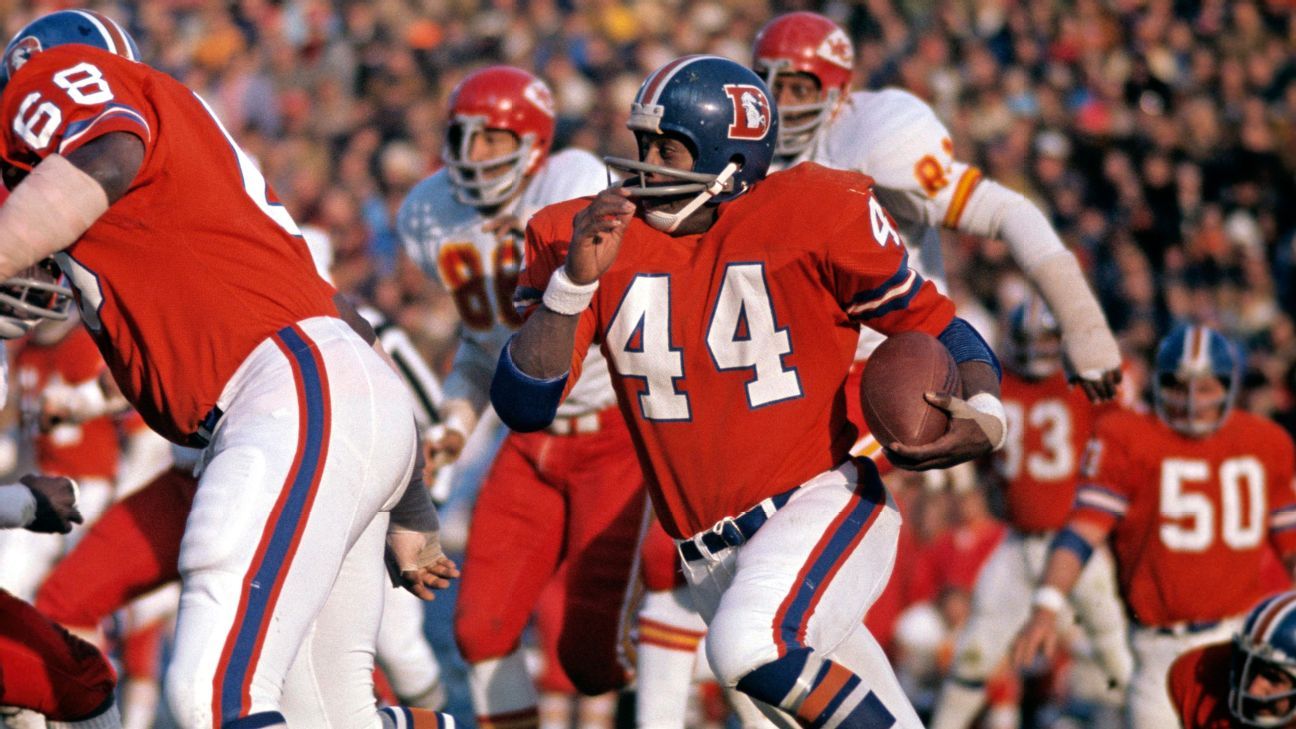ENGLEWOOD, Colo. — Pro Football Hall of Famer Floyd Little, known as “The Franchise” in his career with the Denver Broncos, died on New Year’s Day. He was 78.
Little had been diagnosed with cancer, which became public this past May, and had been moved to hospice care in November.
“Floyd Little was a true hero of the game. He was a man of great integrity, passion and courage,” Pro Football Hall of Fame president and CEO David Baker said in a statement. “His contributions off the field were even greater than his amazing accomplishments he did on it. Floyd’s smile, heart and character epitomized what it meant to have a Hall of Fame life.
Little’s family, in a statement, said: “The family extends their gratitude to all who have supported Floyd Little and his family during this time with prayers, calls and your heartfelt expressions of love.”
NFL commissioner Roger Goodell said those around Little were proud to have known him. “I was so fortunate to know Floyd and witnessed first-hand the impact he had on others,” Goodell said in a statement. “Whenever he represented the Broncos at the annual NFL Draft, others immediately sought to greet him and his genuine excitement of being with his fellow Legends and his pride and passion for the Broncos was unmistakable. “Football, the Broncos and the NFL were a large part of his life, but nothing could surpass his love and affection for his wife DeBorah and his children, Marc, Christy and Kyra. To them and the entire Little family we extend our deepest sympathy.”
For many in the Broncos’ passionate faithful, Little was the team’s first star. Always a vibrant presence at team functions through the years, Little had also become a regular at enshrinement ceremonies in Canton, Ohio, for the Pro Football Hall of Fame over the past decade.
Little was enshrined in the Hall’s Class of 2010. A three-time All American at Syracuse, Little was enshrined in the College Football Hall of Fame as well.
“I feel so blessed in everything, and as long as I can I will always come back [to Canton], and I always hope to see many more Broncos here with me as the years go by,” is how Little put it in 2019 when both Champ Bailey and Broncos owner Pat Bowlen were enshrined. “Football has given me so much and I will always try to give back in every way to young people who need our help.
“I’ve always been blessed around the game and through all the aches and pains will always feel that way.”
After the Broncos’ Nov. 22 win over the Miami Dolphins, when Denver rushed for 189 yards as Denver South High School’s Phillip Lindsay finished with 89 yards on 16 carries, the team sent a game ball to Little and his family. Little’s wife, DeBorah, later posted photos on social media of the ball in Little’s room in hospice.
Little, who was the sixth pick of the 1967 AFL-NFL draft by the Broncos, played nine seasons with Denver and rushed for 6,323 yards with 43 touchdowns. Those early years of the Broncos franchise — one of the original AFL teams in 1960 — were usually a struggle on the field as Little starred for teams that didn’t make the playoffs.
The Broncos finished with a winning record just twice in Little’s career — in 1973 and 1974. But he was a five-time Pro Bowl selection and led the AFL in combined yards in both 1967 and 1968.
He also became the first player to lead the NFL in rushing while playing for a last-place team (1971 with 1,133 yards). The Broncos didn’t appear in the postseason until the 1977 season, two years after Little’s retirement.
Earlier this year former Syracuse teammate Pat Killorin made Little’s cancer diagnosis public as he created a GoFundMe page called “Friends of Floyd.” Little had stage 2 Neuroendocrine tumor (NET) cancer and more than $100,000 was raised to help the Littles with medical costs.
From 2011-16 Little worked in the Syracuse athletic department and in 2016 was given an honorary doctorate degree from the school.
Little had his No. 44 retired by both Syracuse and the Broncos. With the Broncos Little was called “the Franchise” because his signing, when players could choose between the NFL and AFL, was credited with keeping the team from relocating in the 1960s and with helping to convince local voters to approve funds to build Mile High Stadium.
